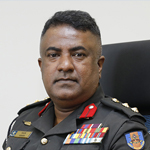by Colonel Nalin Herath and Charani LCM Patabendige
Published on The Morning on 05th November 2024.
Media can undoubtedly be used as a weapon of destruction, a tool of information, or a means of defence.
It has become an integral part of everyday life, particularly social media, broadcast, and print media. But what is media?
Media, as defined by Ozturk in the ‘Handbook of Research on the Impact of Culture and Society on the Entertainment Industry’, “is a term which covers all the means of communication that have functions such as informing, raising awareness, education, socialisation, entertainment, and agenda-setting, including all kinds of oral, written, and visual images.” Media has both direct and indirect effects on national security, and its misuse can have devastating consequences. On the other hand, ethical media practices can foster stability, national reconciliation efforts and promote informed participation in times of crisis and in today's life.
Media has many positive aspects that offer great potential. An example – for information dissemination, the media provides timely and accurate information to the public, fostering awareness and understanding of national security threats. This allows the public to be informed, vigilant, and responsible and act proactively. Media also plays a pivotal role in shaping public perceptions. When the media presents truthful narratives, the public can engage in better-informed debates and share opinions more thoughtfully. Additionally, independent media can hold governments accountable, preventing abuses of power and promoting transparency. Media can also promote national unity by fostering a sense of cohesion during crises or reconciliation efforts.
However, there are also negative aspects. Misinformation and disinformation pose significant threats to modern societies. Misinformation involves the spread of false information without intent, while disinformation is the deliberate dissemination of false or misleading information to achieve ulterior motives, including undermining national security by creating confusion and distrust. This was especially evident during conflicts. For example, in James' work ‘Experts Reflect Role of Media in Rwandan Genocide on Its Anniversary’, Mbaraga stated that "journalists ditched their professionalism and became propagandists," highlighting the need for journalists to foster reconciliation rather than contribute to human rights abuses.
Media can also perpetuate sensationalism, where overly sensationalised reporting causes unnecessary panic and anxiety. This occurred in Sri Lanka after the Easter Sunday attacks, leading the Government to ban social media to prevent the spread of false and hateful content. Needless to say there is also the emerging as well as increasing trends in algorithmic manipulations and deepfakes, these matters are seldom thought of in Sri Lanka’s security sphere.
Additionally, not all information is open access; matters of national interest and classified content exist. The media's pursuit of information can sometimes compromise national security by revealing sensitive data. There are also instances of foreign interference, where ill-intentioned foreign actors exploit the media to spread propaganda and destabilise countries. When looking at the Sri Lankan context, as per, (DataGuidance, 2024) this is why “The Online Safety Act, [came into effect] as published in the Gazette of Sri Lanka on February 2, 2024, aims to protect individuals from harmful online communications, preserve judicial integrity, prevent misuse of online accounts and bots, and stop the support of platforms that frequently communicate prohibited statements. It mandates the establishment of the Online Safety Commission as the competent authority to enforce the Act.” This pivotal step taken by the Sri Lankan Government amidst controversy showcases the need to prevent controversies which will cause disharmony.
As such media holds potential to inform, shape public opinion, and foster national unity, it also carries significant risks if misused. Governments, media organisations, and individuals must act responsibly to strike a balance between freedom of expression and safeguarding national security. Media professionals need to adhere to ethical standards and codes of conduct, while governments should transparently regulate misinformation and be more accountable themselves.
By fostering collaboration and maintaining accountability, both media and governments can ensure that media serves as a constructive force in promoting national security rather than undermining it; to do this it is pivotal to instil media literacy, best practices of constructive criticisms as well as healthy debates as well.
Link to the original source : Click here

* Colonel Nalin Herath is is the overlooking Director General and Acting Director of Research of the Institute of National Security Studies(INSS), the premier think tank on National Security established and functioning under the Ministry of Defence. The opinions expressed are his own and do not necessarily reflect the views of the Institute or the Ministry of Defence.

* Ms. Charani Patabendige is an Acting Research Analyst and a Research Assistant at the Institute of National Security Studies (INSS), the premier think tank on National Security established and functioning under the Ministry of Defence. The opinions expressed are her own and do not necessarily reflect the views of the Institute or the Ministry of Defence.